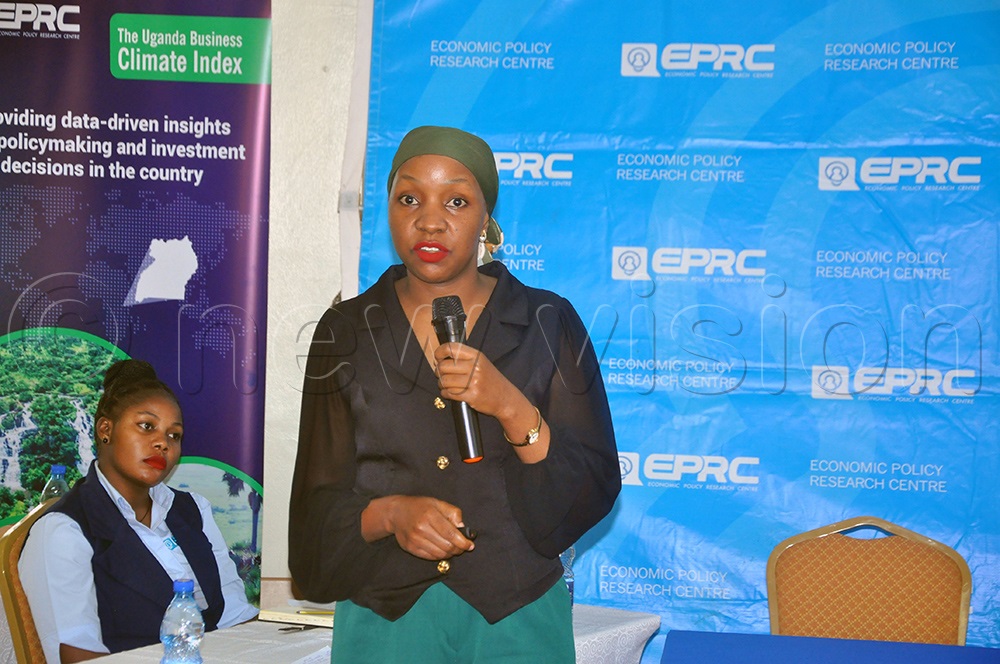Uganda business confidence rises, but challenges persist—report
While the figure remains below the neutral benchmark of 100 (the threshold that signals an improving business environment), it marks a step forward for Uganda’s economic sentiment, particularly after a subdued start to the year.
Kahunde (Left), research analyst at the Economic Policy Research Centre (EPRC) discussing the index at the EPRC offices at Makerere University, Kampala. Looking on are Kasirye (Right), the director of research at the EPRC and Sserunjogi (Centre) a research fellow at EPRC. (Photo by John Odyek)
___________________
Business confidence in Uganda edged upward in the second quarter (Q2) of 2025 (April-June), according to the latest Uganda Business Climate Index (UBCI) report released by the Economic Policy Research Centre (EPRC). The index rose by 3.7 points from 88.8 in Q1 (January-March) to 92.5 in Q2 2025, reflecting cautious optimism in the private sector.
While the figure remains below the neutral benchmark of 100 (the threshold that signals an improving business environment), it marks a step forward for Uganda’s economic sentiment, particularly after a subdued start to the year.
“Our latest index captures cautious optimism among Ugandan businesses,” EPRC research analyst and co-author of the report Rehema Kahunde said during the release of the index at the EPRC offices at Makerere University, Kampala, on Wednesday, July 23, 2025.
“Demand picked up around Easter and the school term reopening, which boosted sales and improved business sentiment. However, persistent challenges continue to weigh heavily on firms,” Kahunde explained as she presented the index.
Rehema Kahunde, research analyst at the Economic Policy Research Centre (EPRC) presenting the index at the EPRC offices at Makerere University, Kampala. (Photo by John Odyek)
The services sector posted a modest gain, rising to 94.7, up from 92.3 in Q1. Growth was driven mainly by large firms in education, financial services and logistics, which benefited from increased activity, better pricing and higher profitability.
In contrast, agriculture dipped to 98.3 from 99.3, weighed down by declining coffee prices that discouraged production and sales.
Manufacturing fell further behind, dropping to 79.9 from 81.6, as firms reported mounting power instability, shrinking margins, high input costs and a shortage of skilled labour.
Despite the relative improvements, all sector indices remained below the 100 threshold, reflecting that business conditions are still weaker than the long-term average.
The report highlights recurring and intensifying challenges that include multiple taxation and growing competition from informal businesses, which remain widespread.
It noted that macroeconomic pressures such as inflation, interest rates, and exchange rate volatility continued to strain business operations.
Power supply issues intensified, particularly in the wake of the April 2025 transition of electricity distribution from UMEME Uganda Ltd to the Uganda Electricity Distribution Company Ltd.
Notably, 42% of businesses reported being negatively affected by the power transition. Key issues included: Increased power outages (74%), A perceived higher electricity costs and voltage fluctuations (10%).
“Ever since the power company changed hands, outages have been more frequent, and it is hurting our productivity,” lamented a Kampala-based manufacturer.
“We have had to run on generators more often to keep production on track, which drives up our costs. We are really hoping UEDCL will stabilise the power supply soon.”
Regional and Structural Disparities
Challenges such as multiple taxation and informal competition were more severe in central, western, and eastern regions compared to the north. Infrastructural bottlenecks, limited access to finance, and poor local demand further constrained firms in these regions.
“Tax-related challenges keep surfacing every quarter,” Kahunde noted. “This points to the urgent need for reforms in taxation and formalisation to ensure a more enabling business environment,” she added.
The EPRC forecasts an improved UBCI of 100.3 for Q3 (July–September 2025), marking a return to above-average business confidence.
This optimistic projection is underpinned by expected increases in demand, especially due to election-related government spending and a projected drop in input costs. The agriculture sector is projected to rise to 109 during the harvest season.
Services are expected to climb to 101, while manufacturing may edge up to 82.
“The anticipated uptick in activity from political spending to seasonal harvests could lift the index back to neutral or even positive territory, but this can only be sustained if structural issues are addressed.”
Policy Recommendations
To build on this momentum and improve the business environment, EPRC recommends the following: strengthening power infrastructure in industrial zones through sustained investment by the Ministry of Energy, Mineral Development and the UEDCL.
They call for combating electricity infrastructure vandalism through stricter enforcement and community awareness.
They proposed promoting a peaceful election cycle through intensified civic education and protection of businesses and property.
EPRC director of research Dr Ibrahim Kasirye said while business optimism is rising, it may not necessarily translate into increased investment. He explained that many businesses are currently operating below full capacity, meaning they can expand output without making new capital investments.
EPRC research fellow Dr Brian Sserunjogi welcomed the Government’s initiative to clear domestic arrears, saying it would release much-needed capital and support the recovery and growth of businesses. Sserunjogi emphasised the need to enforce trade order in Kampala and other urban centres, as well as to improve physical development planning.
Sserunjogi further urged the Government to invest in civic education to help prevent election-related violence, which can have a damaging effect on the business environment.
Emmanuel Eron, a research fellow at EPRC, pointed out that the decline in foreign aid, particularly following the suspension of funding by USAID, has led to job losses.
Eron warned that the full impact of these cuts would likely be reflected in reduced Pay As You Earn (PAYE) tax collections in the 2025/26 financial year.
Florence Nakazi, another research fellow at EPRC, highlighted significant opportunities in coffee exports. However, Nakazi stressed the importance of addressing concerns about quality and promoting value addition to maximise earnings from the sector.